Overview
'Ren' in Mandarin translates to 'person' or 'people', and true to our name, this app is all about managing one’s network of clients in an organized, efficient and intuitive manner. InsuRen is geared to the needs of the modern Insurance salesman, but anyone whose business is their strong rapport with their clients will find this to be an indispensable tool.
Summary of contributions
-
Major enhancement: added the ability to schedule meetings with clients
-
What it does: allows the user to schedule a meeting with a client. Schedule meetings can be searched using the meetings command.
-
Justification: This feature allows insurance agents to keep track of their schedules by enabling them to have a record of all their meetings. It also allows them to quickly search through all their meetings, and prevents them from accidentally scheduling clashing meetings.
-
Highlights: This enhancement added a new command. It required the use of multiple Java API classes for the validation of dates and times, as well the implementation of a new global data structure to store all meeting timings to prevent meetings from being scheduled at the same time.
-
-
Minor enhancement: added shorthand commands for all existing commands for faster access.
-
Code contributed: [RepoSense]
-
Other contributions:
-
Project management:
-
Managed releases
v1.1-v1.2(2 releases) on GitHub
-
-
Documentation:
-
Community:
-
Contributions to the User Guide
Given below are sections I contributed to the User Guide. They showcase my ability to write documentation targeting end-users. |
Add meeting time: schedule
Add a meeting at the input date and time with a specified person.
Format: schedule INDEX m/DD/MM/YY HHMM
Shorthand: sch
Example:
-
schedule 1 m/12/03/19 0930
InsuRen will record that a meeting is scheduled on 12 March 2019, 0930 with the first entry.
View meeting timings: meetings
Displays the details of the meeting at the input date and time.
Format: meetings [DD/MM/YY]
shorthand: m
Example:
-
meetings 23/02/18
InsuRen displays meetings scheduled on 23rd February, 2018.
Notifications for expiring plans [coming in v2.0]
InsuRen entries have an optional field for date of plan expiry. You will automatically be notified of clients
with plans expiring within a month from the day when InsuRen is initialized.
No additional search queries are needed.
Contributions to the Developer Guide
Given below are sections I contributed to the Developer Guide. They showcase my ability to write technical documentation and the technical depth of my contributions to the project. |
Schedule feature
Current Implementation
The schedule mechanism is facilitated by the new Command, Schedule. It extends AddressBook with a list of meetings, stored internally as a UniqueMeetingList. It also allows meetings to be associated to InsuRen entries, since each Person can have up to one Meeting.
The complete list of meetings, as well as the meetings scheduled on a single day, can subsequently be accessed using the Meetings command.
Additionally, the Schedule Command implements the following operations:
-
ScheduleCommand#createScheduledPerson(Person personToSchedule, Meeting meeting)- Returns aPersonobject that has a meeting scheduled according tomeeting. -
ScheduleCommand#execute()- Executes the command encapsulated byScheduleCommand.
Given below is an example usage scenario and how the Schedule mechanism behaves at each step.
Step 1. The user launches the application and already has at least one client’s contact in InsuRen.
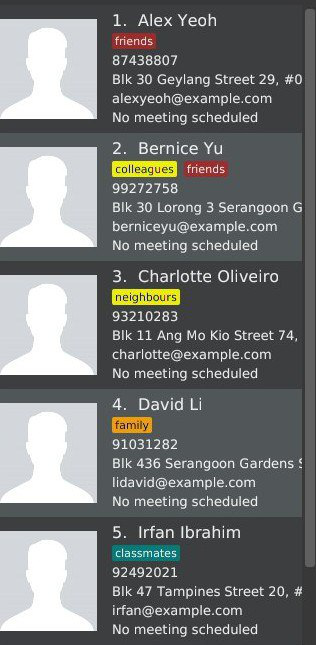
Step 2. The user executes schedule 1 m/16/10/18 1800 to schedule a meeting with the person in the first index at 1800 hours on 16th October, 2018. However, there is already a meeting scheduled at this time, so it is flagged out to the user.
| No meetings are scheduled if there is a clash |
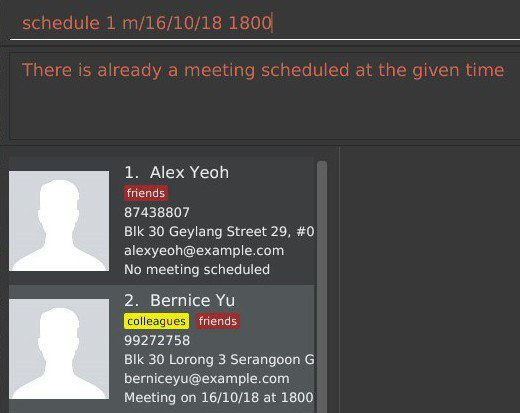
Step 3. The user executes schedule 1 m/32/10/18 1830 but since this is not a valid date, InsuRen flags it out to the user.

Step 4. The user executes schedule 1 m/16/10/18 1830. The meeting is schedule and the person card is changed to reflect the same accordingly.
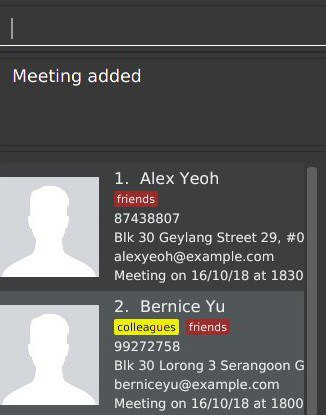
The following activity diagram summarises what happens when a user executes the ScheduleCommand:
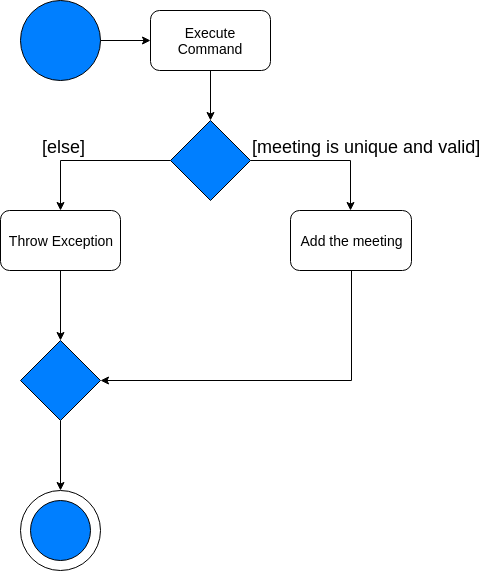
The following sequence diagram shows how the operation itself works.
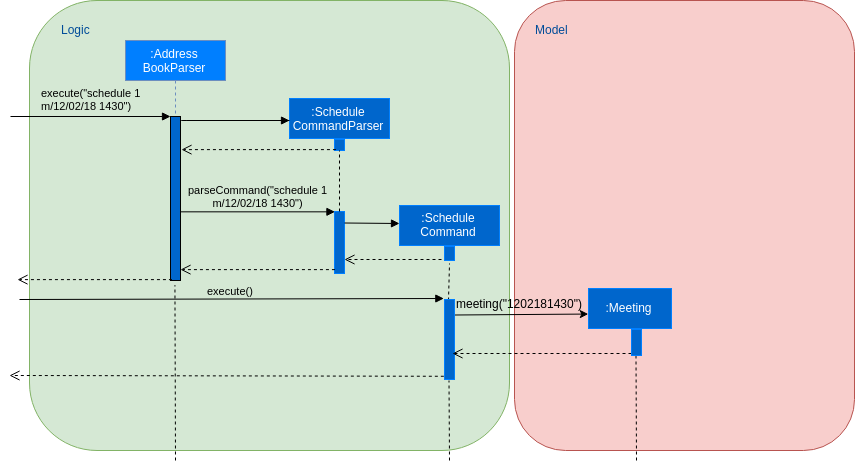
Design Considerations
Aspect: Where meetings are stored
-
Alternative 1 (Current choice): The meetings are stored in both the
Personmodel and in the global meeting listUniqueMeetingList.-
Pros: Easy to ensure no clashes occur between meetings.
-
Cons: Significant changes need to be made to the model to accomodate this.
-
-
Alternative 2: The meetings are stored in only the
Personmodel.-
Pros: Minimal changes to the model required; prevents duplication of data.
-
Cons: Difficult to ensure uniqueness of meeting times.
-
-
Alternative 3: The meetings are stored in only the
UniqueMeetingList.-
Pros: Prevents the duplication of data; easy to ensure no clashes.
-
Cons: Would need additional data structures to pair the meeting to the entry.
-
Aspect: Date storage format
-
Alternative 1 (Current choice): The date and time is stored as a 10-character string.
-
Pros: Allows the setting of a
nonevalue, and offers flexibility. -
Cons: Does not utilize the Java API libraries for dates and times.
-
-
Alternative 2: The date and time is stored as a
DateAndTimeobject.-
Pros: Ability to use Java API functions for dates.
-
Cons: Less flexible as all dates entered must be valid.
-
Adding a Meeting
-
Adding a meeting to a person while all persons all listed.
-
Prerequisites: List all persons using the
listcommand. Multiple persons in the list. -
Test case:
schedule 1 m/21/02/18 1430
Expected: First client is scheduled for a meeting on 21st February 2018, at 1430. Timestamp in the status bar is updated. -
Test case:
schedule 0 m/21/02/18 1430
Expected: Nothing is updated. Error details shown in the status message. Status bar remains the same. -
Test case:
schedule 1 m/31/02/18 1430
Expected: Nothing is updated. Error details shown in the status message. Status bar remains the same. -
Test case:
schedule 1 m/21/02/18 2630
Expected: Nothing is updated. Error details shown in the status message. Status bar remains the same.
-
Searching by Meetings
-
Searching for people by meetings.
-
Prerequisites: Two persons in the list. One must have a meeting scheduled on 21st February 2018, and the other must have a meeting scheduled on 23rd February 2018.
-
Test case:
meetings 21/02/18
Expected: The client with the meeting on 21st February 2018 is listed. -
Test case:
meetings 23/02/18
Expected: The client with the meeting on 23rd February 2018 is listed. -
Test case:
meetings
Expected: Both clients are listed. -
Test case:
meetings 24/02/18
Expected: No clients are listed. -
Test case:
meetings 31/02/18
Expected: Nothing is updated. Error details shown in the status message. Status bar remains the same.
-